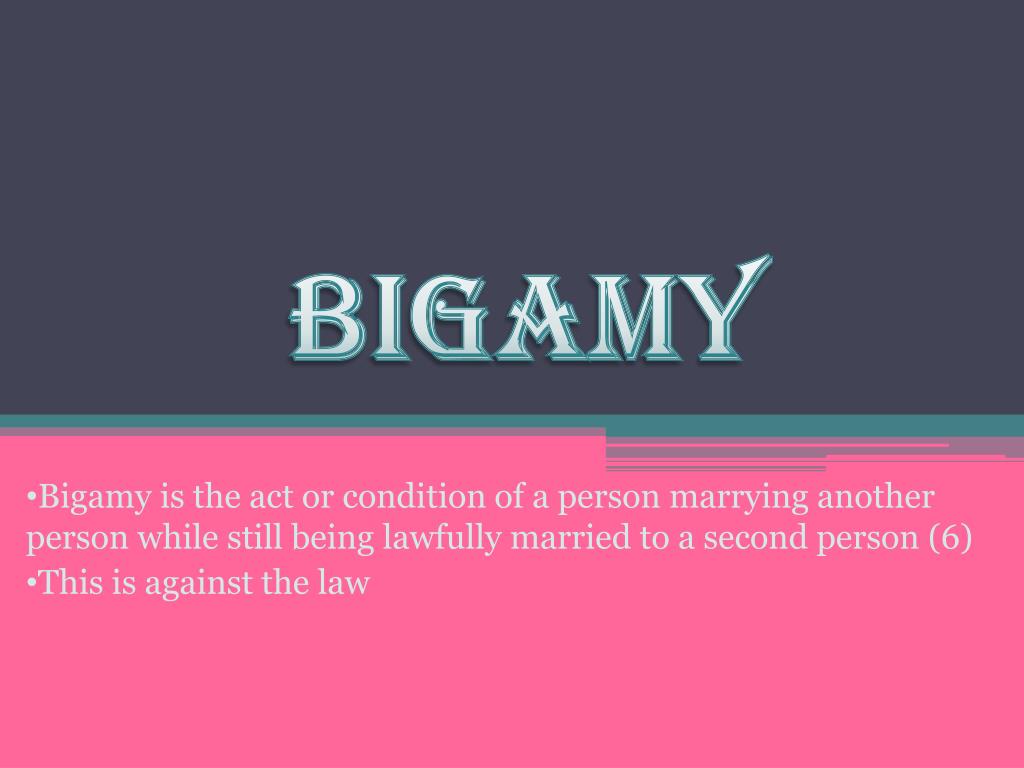Sometimes, life brings us to situations where the rules about relationships and legal bonds can feel a little bit confusing. When we talk about marriage, there's a common idea that it's usually between two people. But what happens when someone decides to tie the knot with another person while still connected to a previous marriage? That, you know, brings us to a specific term that has some rather significant legal and social implications. It’s a situation that, in simple terms, involves a person having more than one spouse at the same time, which is something many places just don't allow.
This idea of being married to two individuals simultaneously, that is, what we call bigamy, is something that often comes up in discussions about marital laws. It’s a situation where someone goes through a marriage ceremony with a new person, even though they haven't ended their previous marriage in the eyes of the law. You see, for example, if a person gets remarried before their earlier marriage's official separation or divorce is completely finished, that really counts as bigamy. It’s a concept that touches upon how societies view the structure of families and partnerships, and it has some very clear boundaries set by legal systems around the globe, basically.
So, when you hear someone mention bigamy, they are essentially referring to the act of entering into a marriage with one individual while still legally bound to another. It's a situation that, in many parts of the world, is viewed as a serious breach of the law, especially in places where the custom is to have just one partner in a marriage. The core idea behind it is pretty straightforward: it’s about having two spouses at the same time, and that's something that just isn't permitted in a lot of legal frameworks. This sort of thing, quite naturally, carries some pretty heavy consequences for those involved.
Table of Contents
- What Is the Bigamy Meaning?
- Is Bigamy a Criminal Act?
- When Does the Bigamy Meaning Apply?
- What If a Spouse Is Unaware of the Bigamy Meaning?
What Is the Bigamy Meaning?
When we talk about the bigamy meaning, we are really talking about a very specific kind of situation involving marriage. It's the act of getting married to someone new while you are still, in the eyes of the law, married to another person. This isn't just about being in a relationship with two people; it's about the formal, legal bond of marriage existing with two different individuals at the very same moment. So, it's almost like having two marriage certificates active at once, which is, you know, generally not how things are supposed to work in many places. The idea is that a person can only be legally tied to one spouse at any given time, and if they try to form another such bond without dissolving the first, that's where this term comes into play. It describes a situation where a person, perhaps without fully realizing the implications or maybe with a clear intent, takes on a second marital commitment while still bound by a first. This really gets at the heart of what bigamy means in its most basic sense, as a matter of fact.
The Bigamy Meaning in Simple Terms
To put the bigamy meaning into words that are very easy to grasp, it simply involves having two spouses at one time. Imagine a person who is already married, and then, without getting a divorce or having their first marriage legally ended, they go through another marriage ceremony with someone else. That specific act, that second marriage while the first is still active, is what bigamy is all about. It’s not just about living with someone or having a partner; it's about the formal status of being married. This can happen, for instance, if someone rushes into a new marriage without waiting for their divorce papers from a previous marriage to be completely finalized. That, you know, makes it a bigamous situation. The core idea is that the legal system in many countries expects a person to be in just one marital bond at a time, and any deviation from that standard falls under this definition. It's really about the state of being legally connected to more than one person through marriage at the same moment, and that’s a very important distinction to make, basically.
Is Bigamy a Criminal Act?
You might be wondering if bigamy is something that's against the law, and the answer, in most places, is a definite yes. Bigamy is, you know, typically seen as a crime in the majority of countries that recognize only what we call monogamous marriages. What this means is that these countries have laws built around the idea that marriage should be between just two people, and that bond should be exclusive. So, if a person knowingly enters into a bigamous marriage, meaning they are aware they are still legally married to someone else when they get married again, they are committing an act that can lead to legal trouble. It's not just a social faux pas; it's a violation of the legal framework that governs marriage in those societies. The severity of the consequences can vary, but the act itself is usually considered a serious offense. This is because it goes against the very structure of how marriage is defined and protected within these legal systems, which is, you know, pretty significant.
Bigamy Meaning and Legal Consequences
When we look at the bigamy meaning from a legal point of view, it's very much connected to the idea of a criminal offense. The act of marrying one person while still legally tied to another is, in many places, considered a serious breach of the law. This isn't something that's always prosecuted with the same intensity everywhere, but it is, you know, an offense that can carry penalties. For instance, in some situations, the authorities might only pursue a case if there are specific circumstances that make it particularly harmful or public. However, the underlying fact remains that it is a crime in a lot of legal systems. The reason it's treated this way is that it messes with the established order of marriage, which is a very fundamental institution in many societies. It can also lead to issues like fraud, especially if one spouse is unaware of the other marriage. So, the legal system steps in to uphold the principle of one marriage at a time, which is, you know, a pretty big deal in how things are structured. It's basically about maintaining the integrity of marital records and the rights of those involved.
When Does the Bigamy Meaning Apply?
The bigamy meaning really comes into play when a person has a spouse still living and, crucially, has not gone through a valid divorce or annulment from that first marriage. It's not enough to simply be separated or living apart; the legal bond must be completely dissolved for a new marriage to be considered legitimate. So, if someone gets remarried before their previous marriage's divorce is finalized, that's a clear instance of bigamy. This also applies to any violation of canon law concerning marital status that would, you know, disqualify a person from entering into another marriage. The key here is the legal status of the first marriage. If it's still active and recognized by the law, then any subsequent marriage is seen as bigamous. This is why legal processes like divorce are so important; they formally end one marriage so that a new one can be entered into without breaking the law. It's about respecting the legal framework that defines marriage, and that's, you know, a pretty important aspect of the whole thing. Basically, it applies when two legal marriages exist concurrently for one person.
Understanding the Conditions for Bigamy Meaning
To fully grasp the bigamy meaning, it's helpful to understand the conditions under which it occurs. The primary condition is the existence of a prior, still-valid marriage. This means that the person has not obtained a legal divorce, annulment, or had their first spouse declared legally deceased. So, if someone simply separates from their first partner and then decides to marry someone new, without completing the proper legal steps to end the first marriage, that’s when bigamy happens. Another important condition is the act of entering into a new marriage ceremony. It’s not just about living with someone new; it's about going through the formal process of getting married again. This could involve signing papers, having a ceremony, or doing anything that would legally constitute a marriage in that jurisdiction. The intent can vary, too; bigamy can be intentional and consensual, with one spouse, or it can be done without one or both spouses knowing. However, the legal definition of bigamy usually focuses on the objective fact of two concurrent legal marriages, which is, you know, pretty straightforward in its application. It really boils down to the legal status of the relationships involved, as a matter of fact.
What If a Spouse Is Unaware of the Bigamy Meaning?
It's a really interesting, and frankly, quite sad, aspect of bigamy that often neither the first nor the second spouse is aware of the other. This can happen for various reasons, perhaps due to deception on the part of the person committing bigamy. Imagine someone who moves to a new town, or even a new country, and starts a new life, including a new marriage, without ever telling their new partner about their existing marriage. Or, perhaps, the first spouse has no idea that their partner has gone off and married someone else. This lack of awareness on the part of one or both spouses doesn't change the fact that bigamy has occurred, legally speaking. The crime of marrying a person while already legally married to someone else still stands, regardless of who knew what. It does, however, add a layer of complexity to the situation, especially when it comes to the emotional and social fallout for the innocent parties involved. So, while the bigamy meaning itself remains fixed, the human element of unawareness can make these situations particularly difficult and painful for everyone except, perhaps, the individual who initiated the second marriage, you know.
The Impact of Unawareness on the Bigamy Meaning
The impact of unawareness on the bigamy meaning is mostly about the consequences for the people involved, rather than the definition itself. The legal definition of bigamy, that is, the act of marrying someone while still legally married to another, doesn't change based on whether one or both spouses knew about the situation. However, the fact that a spouse might be completely in the dark about their partner's other marriage can lead to a whole host of problems. For the unaware spouse, discovering they are in a bigamous marriage can be devastating, leading to feelings of betrayal, confusion, and a complete loss of trust. It can also complicate matters like property division, inheritance, and even the legal status of children born from the second marriage. While the bigamy meaning remains constant, the unawareness of a spouse can sometimes influence how a case is prosecuted or the specific legal remedies available to the wronged party. It really highlights the deceptive nature of such acts and the potential for deep emotional harm, which is, you know, a very important consideration in these kinds of situations. Basically, it adds a layer of complexity to the human side of the legal issue.
:max_bytes(150000):strip_icc()/GettyImages-1138222275-2b42d1d1b7be4b6fac1e5b13ec0aa3b3.jpg)

